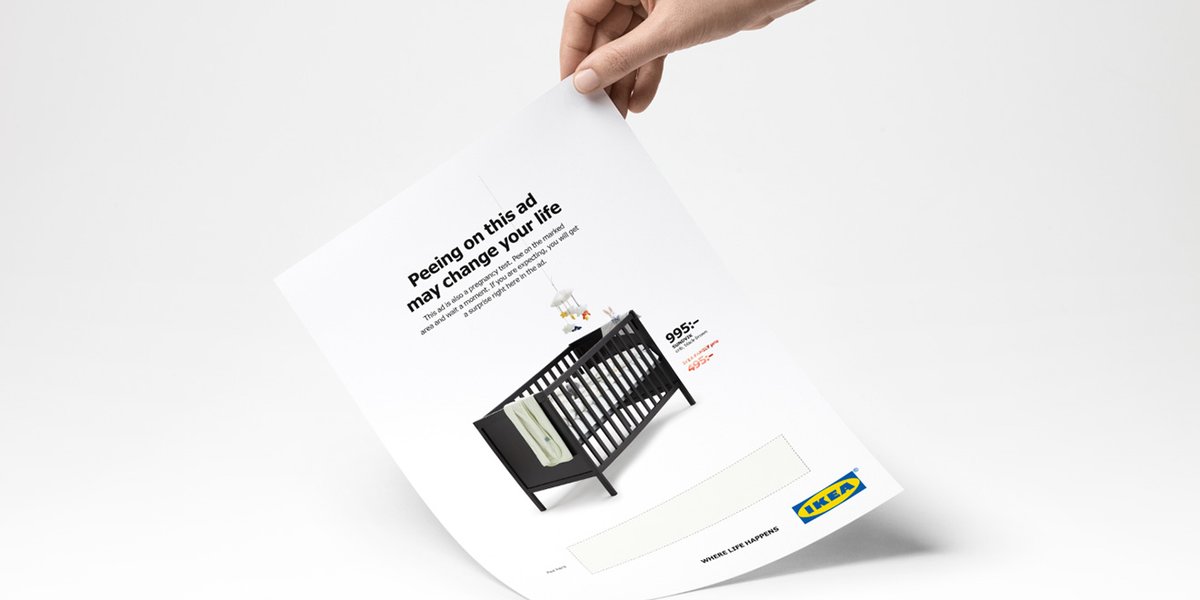By Livia Arndal Woods
The January 13, 2018 episode of NPR’s “Wait Wait…Don’t Tell Me” just drew my attention to an interesting pop culture tidbit. It turns out that the Swedish women’s magazine Amelia ran an advertisement for a discount on an IKEA crib in which the price is revealed via pregnancy-test. In short, you pee on the ad and if you’re pregnant you save 500 Krona (roughly $60) on this Sundvik model.
Tim Nudd broke the story in Adweek last week. That piece includes a video about advertising agency Åkestam Holst’s development of the ad. The video’s central “How it works” progression of images features a pipette releasing drops of yellow liquid onto a rectangular bar along the bottom of the page. “Wait a few minutes” and, just below the regular full price printed in black, the “family price” will reveal itself in a slightly faded red.
Considering the flurry of amused (and icked-out) fluff pieces (in The Guardian, The Washington Post, Newsweek, et cetera) that followed hard upon Nudd’s article, it’s surprising that, as a woman in my mid-thirties whose research tracks sexuality, pregnancy, and childbirth, the algorithms governing which news filters my way hadn’t marked this as a Story For Me. But they hadn’t. It was NPR that turned my attention from “The Victorian Ethics of Reading Pregnancy in Contemporary Bestselling Fiction” (don’t worry, I’ll get back to that one next month!) to pee, pregnancy, and the question of how much MORE money can be made by incorporating women’s reproductive bodies and anxieties into the fabric of market economies. I’m betting it’s a lot and so are IKEA and Åkestam Holst.
You know what else is a lot? The going price of an at-home pregnancy test. You can buy one issue of Amelia from Pressbyrån, Sweden’s most popular newsstand, for 45 Krona ($5.59) OR you can buy the cheapest pregnancy test on the market in Sweden for 69 Krona ($8.57). These prices are roughly comparable to the prices of women’s popular magazines and individually-packaged pregnancy tests in the United States.
Of course, I have to assume that most families are not using IKEA’s ad as the pregnancy test perhaps suggested by the “change your life” headline; in other words, I assume women are not first learning of their pregnancies using these ads. I assume, rather, that families are using the ad as a special-pregnancy-pee-soaked coupon. A special-pregnancy-pee-soaked coupon that is for sure going to cause concern for pregnant women if it malfunctions. But, then again, the ad seems aimed at prenatal concern. Namely, concern about affording the things a baby needs; this concern positions the “peeing on this ad may change your life” headline as meaning something like “this ad will change your life by enabling you to afford that crib you wouldn’t otherwise have been able to.” Because legal residents of Sweden are supported by a reliable social net, these types of concerns are often less dire for Swedish families than for American families. Nonetheless, this ad locates itself at the messy intersection of need, desire, and anxiety.
Last week, Alicia Andrzejewski wrote here about the ways in which miscarriage has been located at a similar intersection throughout Western modernity. Andrzejewski argues that “taking pregnant people’s fear, anxiety, and shame seriously…reveals that we have never been modern when it comes to the “ordering” of desiring female bodies, of how we treat women with needs.” The responsibility and blame we apportion pregnant women shifted from largely moral to largely medical over the last 400 years – from being framed in terms of obedience to and transgressions against God to being framed in terms of obedience to and transgressions against Science. But this “Science” emerged and defined itself in the context of modern notions of “ordering” human control and social progress, notions bound up in the capitalist dream of an ever-increasing prosperity that can free our needs and desires from fear, anxiety, and shame, notions of a paradise that can be bought. You can buy order over the powerlessness of reproduction in a pregnancy test; you can buy a safe place for your baby at a low, low price; you can get both for the price of one in this magazine! All it costs are your bodily fluids (which, the twittersphere’s comments on the Adweek piece helpfully remind us, are gross).



